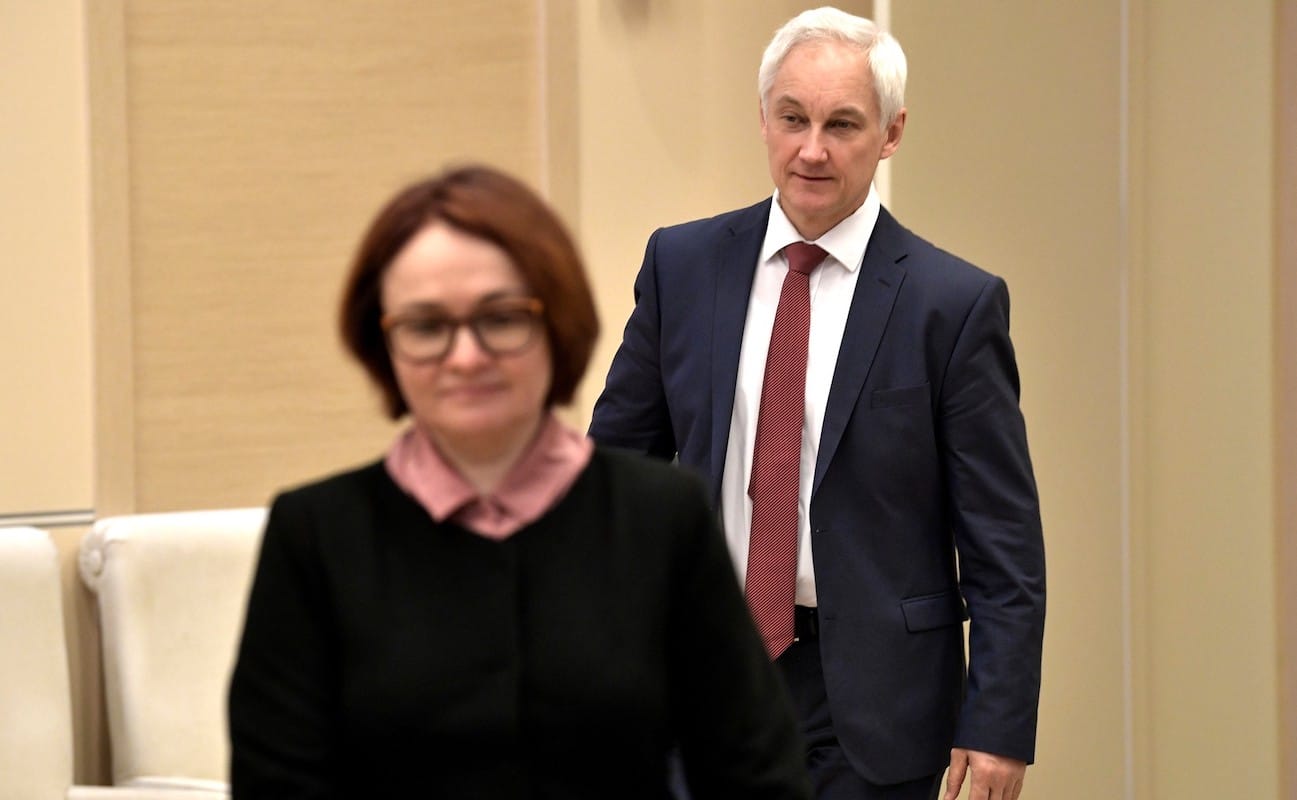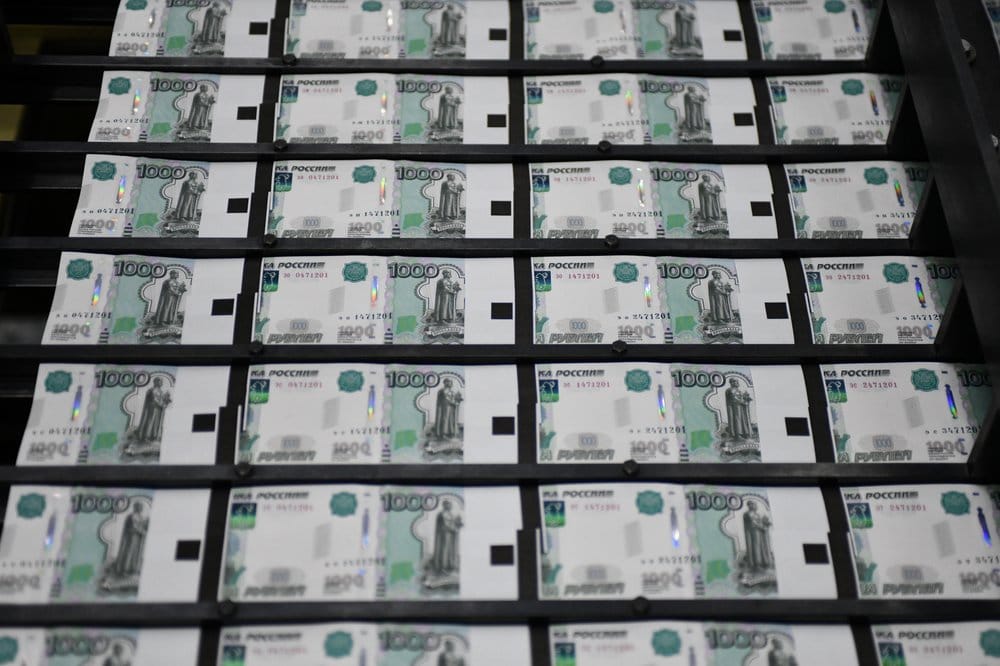
Political divisions in Russia over whether to prop up the ruble
Hello! Welcome to your weekly guide to the Russian economy — written by Alexandra Prokopenko and Alexander Kolyandr and brought to you by The Bell. Our top story this week is about the argument raging among Russian officials about whether to extend a set of extraordinary measures to support the ruble. We also look at why Europe continues to put the brakes on U.S.-led attempts to hand Russia’s frozen assets to Ukraine.
Enforced currency sales debate pits government against Central Bank
The Russian government this week proposed extending a temporary decree issued last year by President Vladimir Putin requiring Russian exporters to convert 80% of their foreign currency earnings into rubles. If approved, instead of expiring in April, the decree would last until the end of this year. A radical measure designed to prop up the Russian currency amid wartime pressures, the compulsory currency sales have helped stabilize exchange rates in the run-up to this March’s presidential election. It seems the old adage is true: there’s nothing more permanent than a temporary solution.
What's going on?
The initial decree was signed by Putin in October during a currency collapse. It meant that every large Russian exporter was obliged to sell at least 80 percent of their foreign currency earnings and buy rubles. Representatives of the state financial monitoring service were assigned to all major exporters to ensure compliance with the new rules.
According to Deputy Prime Minister Andrei Belousov, one of the architects of the original measure, the requirement to sell foreign currency earnings “has demonstrated its effectiveness, helping to stabilize the currency market and reduce pressure on exchange rates.” The Kremlin also supports an extension, said Kremlin aide Maxim Oreshkin.
The Central Bank immediately responded to the proposal, saying it saw no great need to extend the decree. The Russian Union of Industrialists and Entrepreneurs – a business lobby group – also expressed its opposition. If the scheme is to be extended, the Union asked that there be a reduction in the percentage of revenue that must be sold.
The Central Bank expressed two concerns. Firstly, the impact of the compulsory currency sales is overstated, since interest rate hikes are far more important. Secondly, restrictions on exporters are damaging. “These restrictions hamper international payments and make it difficult to pay for the imports and equipment that we need. Therefore, we believe that this decree should remain temporary,” said the head of the Central Bank Elvira Nabiullina.
It’s true that, since compulsory currency sales were introduced, the ruble has recovered from record lows against the U.S. dollar. However, it would be wrong to attribute the currency’s movement solely to Putin's decree.
What’s the significance?
In developed market economies, the forced sale of foreign currency incomes is an extreme measure: it spooks investors, distorts market indicators, and complicates the regulation of the financial system. Organisation for Economic Co-operation and Development (OECD) countries abandoned the mandatory repatriation of foreign currency earnings, and ditched special foreign currency accounts, back in the 1980s. Capital controls are sometimes justified as a means of encouraging financial stability, but only in the short term. Several countries – Malaysia (1997-99), Cyprus (2013-15) and Iceland (2008-11) – successfully introduced them at times of crisis (but removed them at the first opportunity).
In Russia, foreign currency sales were compulsory for 14 years after the end of the Soviet Union – from 1992 to 2006. At that time, it wasn't just about topping up the budget. There was also a desperate lack of trust in the ruble: people sought to dispose of rubles as quickly as possible. The rules were tightened following the 1998 crisis (in this period the requirement was to sell 75% of foreign currency earnings). There was some easing in the following years, but the regulation was not fully repealed until 2006 (when it was presented as a big win for liberals in the government). The liberalization of currency legislation continued through the 2010s. Even during the 2014-15 crisis, when the ruble’s value halved against the U.S. dollar, exporters were only encouraged to sell currency – not obliged to do so.
The only time compulsory currency sales have been imposed since 2006 (prior to the current measures) was in March 2022, immediately after the full-scale invasion of Ukraine. They were lifted three months later as the ruble strengthened rapidly – to as much as 53 against the U.S. dollar.
By the summer 2023, the situation was very different. The ruble had fallen to about 100 against the U.S. dollar, and there were many things influencing this decline: heightened demand for imports; one-off exchange transactions due to the departures of foreign companies from Russia; and slow structural reform of the Russian economy. Put simply, the ruble rate was volatile, but there was no threat to underlying financial stability.
As a result of the decree, exporters really did increase the amount of foreign currency that they sold. These sales helped ease exchange rate volatility, but they were not the only reason for greater stability. High oil prices, currency conversion for dividend payments, and high interest rates also played a role – at least according to comments given by Nabiullina in December. Indeed, the ruble rate is determined by fundamental issues: export opportunities, the demand for imports, and the ruble’s attractiveness as a store of value.
Why the world should care
The introduction of enforced foreign currency sales last year was ultimately a political measure. Putin likes to boast that Russia's economy is doing fine despite Western sanctions, and a wildly gyrating ruble made these boasts appear hollow. While extending the measures will no doubt support the ruble, and give the government a further lever of control, they are also dangerous. The mandatory sale of profits, according to Gazprombank’s managing director Yegor Susin, is a crutch propping up Russia’s abnormal currency market.
US increases pressure to seize frozen Russian assets
The U.S. Senate Foreign Relations Committee voted 20 to 1 on Wednesday in support of the Rebuilding Economic Prosperity and Opportunity (REPO) for Ukrainians Act. If, as expected, it passes the full Senate and House of Representatives and is signed into law by President Joe Biden, the law gives the president the right – but does not oblige him – to seize frozen Russian assets, including sovereign Central Bank funds. This right would remain in place for five years, or until the end of hostilities between Russia and Ukraine.
- Any funds seized by the U.S. under the law would be transferred to a special government account which can pay for the restoration of Ukraine – but the money cannot be used to pay any military expenses.
- In addition, the legislation requires the president to attempt to secure a global agreement on Russian assets. This stipulation accepts the reality of the current situation: there aren't many Russian assets in the U.S., with at least two-thirds of them held in European Union countries. Switzerland has already stated that it will not confiscate assets for a Ukraine reconstruction fund.
- Europe does not appear to be prepared to seize frozen assets. According to Reuters, EU leaders will not even make a political decision at next month’s summit. Luxembourg’s Foreign Minister Xavier Bettel told Reuters this week that the EU will be “very careful” on this issue. “Imagine if we take a decision and then six months later we find that it is not legally possible. Who will pay for it then?” Reuters also quoted an unnamed official warning of financial disaster if Russia responded to any confiscations by nationalizing Euroclear's client accounts – if this happened, the EU could apparently not save Euroclear from bankruptcy.
- Instead, Europe is inching closer to a less ambitious move – seizing the profits from frozen funds via an emergency tax. Bloomberg reported on Monday that EU Foreign Ministers have approved the plan in principle.
- Perhaps more significantly, the Foreign Relations Committee also backed the Transferring Illicit Assets to Ukraine Act . This law would allow the U.S. Department of Justice to not only freeze, but also seize, assets of individuals and companies found to be violating sanctions against Russia, or which are themselves under sanctions. While this is unlikely to raise significant funds to support Ukraine, it adds to the consequences for potential violations of trade and financial embargoes imposed on Russia following the full-scale invasion. It’s possible that Europe could introduce a similar set of measures.
Why the world should care
Right now, we’re unlikely to see a mass confiscation of Russian assets. This means that Western investors should not worry about the nationalization of frozen accounts and companies in Russia. However, Washington will keep pressing its allies to be bolder.
Figures of the week
Inflationary expectations in Russia fell to 12.7% in January (even though the previous month saw inflation peak at 14.2%), according to a brief survey from InFOM, commissioned by the Central Bank. Inflation expectations among respondents who have savings fell from 12.2% in December to 11.2% in January. For citizens without savings, expectations dropped from 16.3% to 14.1%.
Weekly inflation between Jan. 16 and Jan. 22 slowed to 0.07% compared with 0.13% the previous week. Annual inflation also dropped from 7.4% to 7.28%. According to the State Statistics Service, prices for eggs (a politically sensitive topic in Russia) fell 1.4%.
There was a slight (less than 1%, equivalent to 530 million tons) fall in oil and gas condensate production in 2023. This was due to Russia's involvement in oil cartel OPEC’s agreement to freeze output, according to Deputy Prime Minister Alexander Novak. The proportion of Russia's energy exports to BRICS countries rose 46% in 2023, he said.
Further reading
Russia’s Oil Industry Threatened by Ukrainian Drones, Western Sanctions
The Myths That Warp How America Sees Russia—and Vice Versa
Hold, Build, and Strike: a Vision for Rebuilding Ukraine's Advantage in 2024




